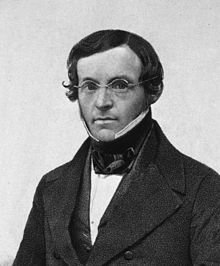Arnold Adolph Berthold
| Arnold Adolph Berthold | |
|---|---|
 |
|
| Born | 26 February 1803 Soest, Germany |
| Died |
3 January 1861 (aged 57) Göttingen, Germany |
| Citizenship | Germany |
| Nationality | German |
| Fields | Physiology, Zoology, Medicine (Endocrinology) |
| Institutions | Georg-August University of Göttingen |
| Author abbrev. (zoology) | Berthold |
Arnold Adolph Berthold or Arnold Adolf Berthold (26 February 1803 – 3 January 1861) was a German physiologist and zoologist. He is known as a pioneer in endocrinology due to his experiments on the role of the gonads in the development of secondary sexual characteristics. He published important works on reptiles and amphibians as well as on avian physiology. In the field of entomology, he authored Natürliche Familien des Tierreichs (1827).
He studied medicine in Göttingen in 1819 and wrote his thesis under the direction of Johann Friedrich Blumenbach (1752-1840). Berthold became a private lecturer in 1825 and began to teach physiology at the University of Göttingen where he spent the rest of his career.
Berthold is particularly famous for his work on endocrinology. It has been argued that Berthold, in 1849, was the first to engage in the formal study of behavioral endocrinology when he performed ground breaking experiments with chicken castration. Berthold noted that the male chickens (roosters) were aggressive; had pronounced comb and wattle; muscles were more developed; crowed; copulated with hens. On the other hand, Berthold noted that the female chickens (hens) were not aggressive; had no comb and wattle; did not crow; did not copulate with hens.
Using Berthold's Strong Inference Approach, Berthold proposed that there must be some 'unseen' differences between hens and roosters that can account for the observed differences; the difference should be eliminated if source is removed before differences are seen; and differences should be reinstated if missing product is restored and is functional. Berhold's experiment showed that when castrated roosters developed the body and behavior of capons: they failed to develop comb and wattle characteristics of roosters; failed to crow; failed to be aggressive; and failed to copulate. Also, Berhold's experiment showed that transplanted testes (that established a blood connection) became functional (i.e., produced sperm and a blood-borne product that affects anatomy and behavior).
...
Wikipedia
